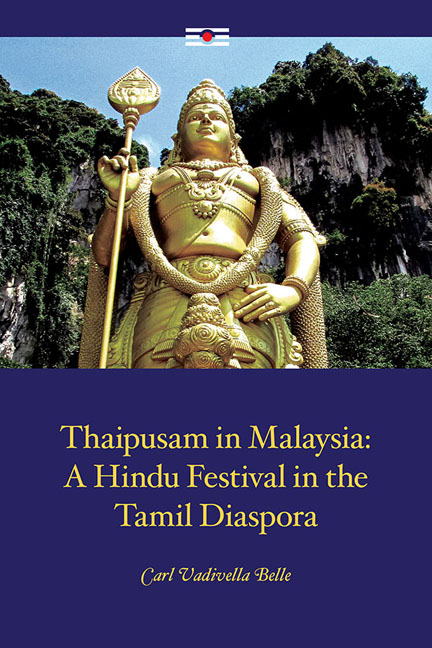Book contents
- Frontmatter
- Contents
- Acknowledgements
- Introduction
- 1 Indians in Malaysia: The Social and Ethnic Context
- 2 Tamil Traditions and South Indian Hinduism
- 3 Colonialism, Colonial Knowledge and Hindu Reform Movements
- 4 Hinduism in Malaysia: An Overview
- 5 Murugan: A Tamil Deity
- 6 The Phenomenology of Thaipusam at Batu Caves
- 7 Other Thaipusams
- 8 Thaipusam Considered: The Divine Crossing
- Conclusions
- Glossary
- Bibliography
- Index
- About the Author
3 - Colonialism, Colonial Knowledge and Hindu Reform Movements
Published online by Cambridge University Press: 12 January 2018
- Frontmatter
- Contents
- Acknowledgements
- Introduction
- 1 Indians in Malaysia: The Social and Ethnic Context
- 2 Tamil Traditions and South Indian Hinduism
- 3 Colonialism, Colonial Knowledge and Hindu Reform Movements
- 4 Hinduism in Malaysia: An Overview
- 5 Murugan: A Tamil Deity
- 6 The Phenomenology of Thaipusam at Batu Caves
- 7 Other Thaipusams
- 8 Thaipusam Considered: The Divine Crossing
- Conclusions
- Glossary
- Bibliography
- Index
- About the Author
Summary
In the previous chapter we noted that most scholars accept that the developments throughout the period of the great dynasties of South India stamped Tamil Hinduism with characteristics which were to prove both formative and enduring. In order to understand the shape of contemporary reformist impulses within South India, it is necessary to explore the ideologies of British colonial rule in India. These ideologies permeated British scholarship in India and ultimately extended to the subject populations. In the process, “colonial knowledge” profoundly reshaped Indian perceptions of their own culture, society and history, setting in train a series of far-reaching (and in many cases continuing) social and political transformations.
The India over which the British East India Company was to assume control consisted of a segmented population of breathtaking diversity, manifesting in a conglomeration of ethnic, linguistic, regional, caste (jati) and religious formations. British orientalist scholarship interpreted this society according to a series of cultural assumptions that were regarded as axiomatic, namely:
India was a timeless, static society whose major institutions — caste, religion, despotic rule — were impervious to change and thus largely immutable. Indian stagnation contrasted with the dynamism and progressivism of Europe.
Throughout its entire history, Indian polities had been ruled by theocratic despots (both Hindu and Muslim). This implied that Indians were accustomed to and required the guidance of firm rule. Indeed, the social, cultural and linguistic differences within India inevitably resulted in civil discourse, unrest and conflict, all of which could only be contained by “the strong hand of the British”.
All of the civilizations which had invaded and conquered India had declined under the twin impact of the intolerable climate and the inevitable degeneration resulting from miscegenation. It followed that if the British were to survive as rulers they had to remain independent of the degraded races which inhabited India.
All knowledge of Indian religious customs and law could be derived from ancient texts. It followed that the investigation of original scriptures would uncover the abiding procedures and principles by which Indian society should be regulated. A corollorary of this thesis was that all of India's problems sprang from deviation from and corruption of pristine Vedic ideals. This perspective insisted upon the primacy of Sanskrit as the sacred language of Hinduism.
- Type
- Chapter
- Information
- Thaipusam in MalaysiaA Hindu Festival in the Tamil Diaspora, pp. 65 - 85Publisher: ISEAS–Yusof Ishak InstitutePrint publication year: 2017



